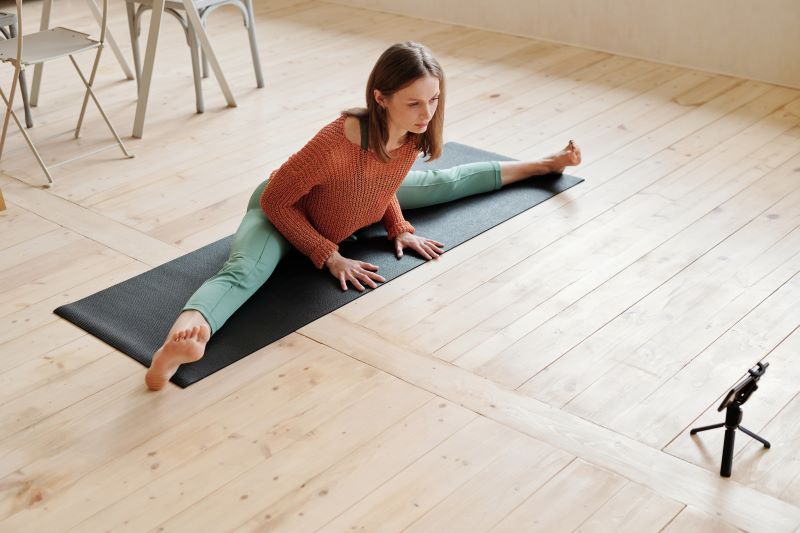Reviewed by: Durham Weeks III, MD
Your hips are one of the most important joints in your body, allowing you to stand, walk, run, and enjoy your active lifestyle for a long time. However, like any other joint, your hips can be susceptible to injury and conditions that can cause pain and limit your mobility. OrthoCarolina is here for tips for healthy hips, risk assessments, and treatment of injuries to help you make the better choice when it comes to your orthopedic care.
The Importance of Hip Health
Your hips are the unsung heroes of your entire body. When everything is aligned and working fine, you might not think too much about them, but the slightest hip misalignment over time can cause serious issues in parts of your body you might not expect.
Make your way to a yoga or Pilates class, and you’ll hear all kinds of terms thrown around related to hip mobility…flexion, extension, axis, adduction, abduction. All the complicated physiological talk can be overwhelming, but rest assured OrthoCarolina’s specialist hip providers have all the resources you need for maintaining hip mobility.
Who to See for Hip Pain
One of the best ways to address concerns about your hips is by first having an exam with a hip-specific orthopedist. A clinician that specializes in hips at OrthoCarolina can assess your symptoms through physical examination, X-rays, and MRIs.
X-rays are the cornerstone and often help to determine an initial path forward as you can view arthritis, rotational issues, impingement and developmental problems like dysplasia that could be present.
A physical exam from a hip-specific orthopedist is key to determining what findings on the X-ray may be related to a specific pain. Or if normal, then the exam can help determine if muscle imbalances, weakness or even tightness might be at play. From here, getting a referral to one of OrthoCarolina’s physical therapists (PT) can be helpful to better assess function of your smaller muscles of the hip, or working on constructing an in-depth therapy program to build strength or flexibility.

Physical exams can also determine if more advanced imaging like an MRI could be needed. OrthoCarolina’s network of experienced orthopedic specialists has you covered for routine maintenance of your hips and identification of underlying issues. Some of the specialized treatments for hip health at our centers include:
- Physical therapy and customization of workouts
- Orthopedic specialist care
- Guided injections
Hip Mobility – Preventive Practices
For anyone, regardless of age, body type or activity level, three of the primary pillars for hip health include:
- Having an active lifestyle
- Maintaining a healthy weight
- Proper posture and alignment (both while at rest and during activity)
- Gluteal and core muscle strength
At OrthoCarolina we focus on preventive care and management of hip health. For active people, management of hip health is essential, and if you’re starting to experience any pain or symptoms in your hip, we encourage you to seek care at one of our orthopedics centers.

Staying Active for Hip Mobility
Regular exercise can help strengthen the muscles that support your hips and improve your range of motion.
Sitting in chairs all day long, whether you’re a gamer, desk employee, or student can take a huge toll on your hips. Taking breaks for stretching, walks, and maintaining an active lifestyle outside of your time spent sitting down is the best defense against tightness in your hips and degenerative hip injuries.
Proper Hip Posture and Alignment
Slouching from bad posture might bring spine and back issues to mind, but posture also affects your hips. Working with a physical therapist, occupational therapist, or orthopedic specialist is the most reliable way to keep hips healthy, or get back on track if you’re experiencing symptoms of hip pain.
3 Easy, Effective Hip Mobility Stretches
- Flexor stretch. Kneel on one knee with the other foot in front of you, making sure your knee is directly over your ankle. Slowly shift your weight forward until you feel a stretch in your hip flexor. Hold for 30 seconds and then switch sides.
- Hip rotation stretch. To perform this stretch, lie on your back with your knees bent and feet flat on the ground. Slowly lower both knees to one side, keeping your shoulders flat on the ground. Hold for 30 seconds and then switch sides.
- Exercises that focus on hip strength. Gluteal bridges (aka pelvic bridges), single leg balancing exercises, and resistance band exercises like a “monster walk” are exercises that can help strengthen the muscles that support your hips and improve your range of motion over time.
It’s important to consult with a professional about hip mobility concerns. Make an appointment at OrthoCarolina, and work with our team to ensure long-term hip health, so you can keep up your active lifestyle and prevent injury.



